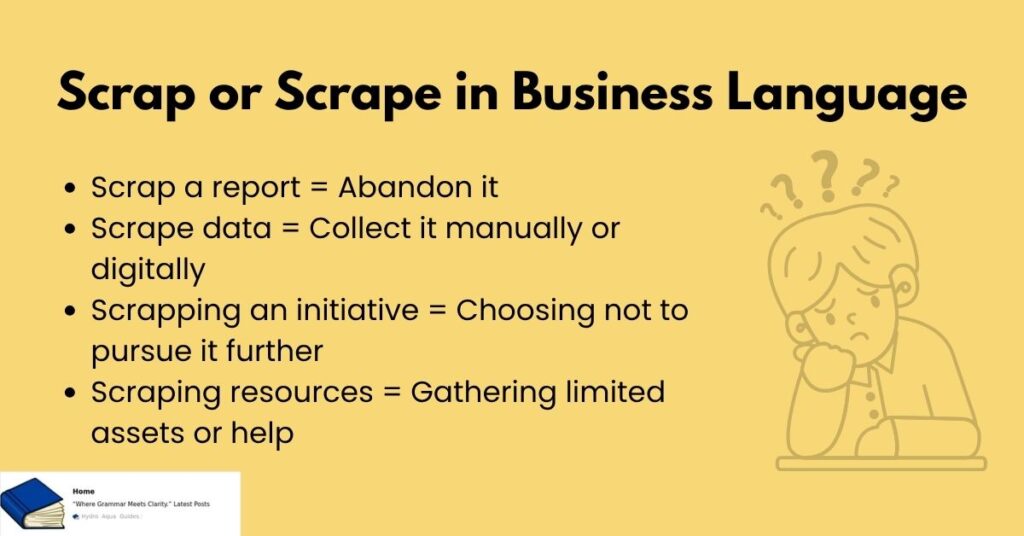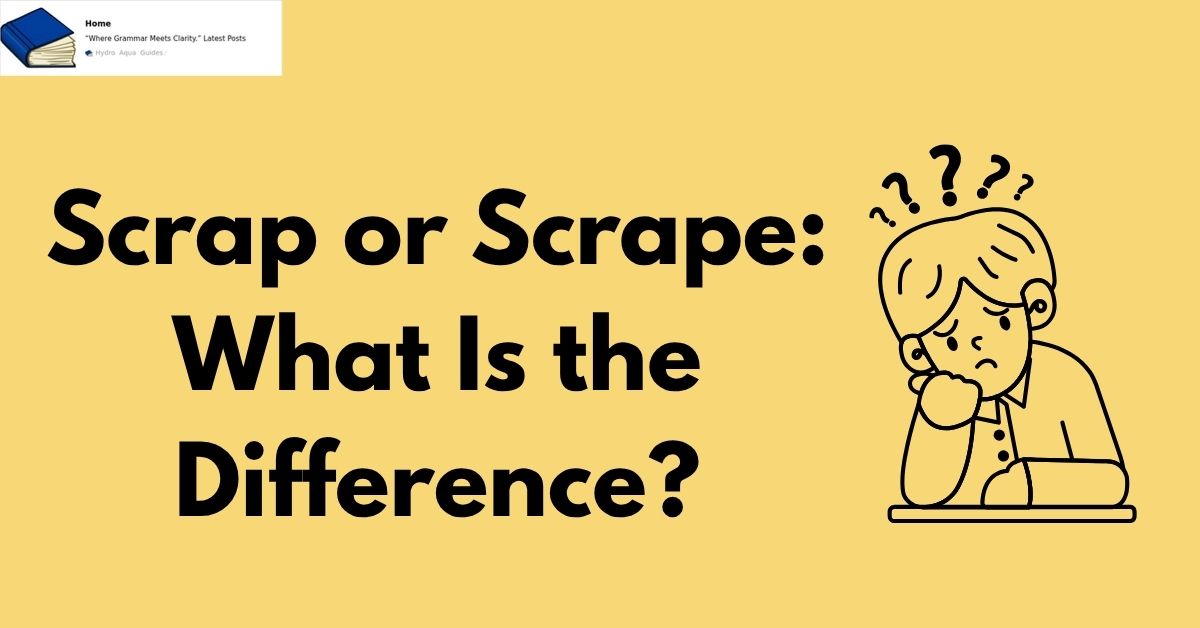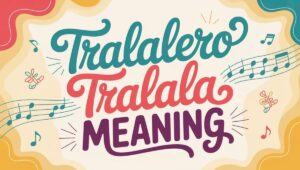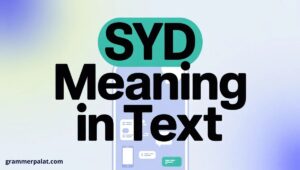English is full of words that look similar, sound alike, or even seem interchangeable but aren’t. Among the most commonly confused pairs is “scrap or scrape.” Whether you’re writing a blog post, texting a friend, or drafting an email, using the wrong one can twist your meaning in unexpected ways.
Let’s break it all down so you never second-guess these two words again.
What Does “Scrap” Mean?
The word “scrap” can act as both a noun and a verb, and each usage carries distinct meanings.
✅ As a Noun
As a noun, scrap typically refers to something leftover or discarded especially something small.
- Examples:
- Lena tossed a scrap of paper into the bin.
- The welder collected the scrap metal for recycling.
Here, scrap implies waste or unused material. In industries like construction or metalwork, the term scrap metal refers to bits of metal left over after cutting, welding, or manufacturing. It’s not trash it’s often recyclable and even valuable.
✅ As a Verb
As a verb, scrap means to abandon, eliminate, or discard something usually because it’s not needed or no longer useful.
- Examples:
- The company decided to scrap the project due to budget cuts.
- Mark scrapped his old laptop after it stopped working.
What Does “Scrape” Mean?
Unlike “scrap,” the word scrape is almost always a verb, though it has a noun form too.
✅ As a Verb
To scrape means to remove something by dragging or rubbing, often with a hard object.
- Examples:
- I had to scrape the ice off my windshield this morning.
- She scraped mud off her boots before coming inside.
It can also mean to injure the surface of something especially skin by rubbing it against a rough surface.
- Charlie scraped his knee when he fell off his skateboard.
✅ As a Noun
As a noun, a scrape is either:
- A minor abrasion or injury, or
- A difficult or embarrassing situation.
- Examples:
- I got a scrape on my elbow during the hike.
- He got into a bit of a scrape with the school principal.
Scrap vs Scrape: Key Differences
The difference between scrap and scrape lies in meaning, function, and usage. Let’s compare the two head-to-head:
| Feature | Scrap | Scrape |
|---|---|---|
| Part of Speech | Noun & Verb | Mostly Verb, sometimes Noun |
| Primary Meaning | Discard or leftover item | Rub to remove or minor injury |
| Example Noun Usage | Scrap metal, scrap of paper | A small scrape on the arm |
| Example Verb Usage | Scrap the plan, scrapped the idea | Scrape the gum off the table |
| Contexts Used | Industry, technology, decisions | Cleaning, injuries, difficult situations |
So if you’re talking about removing something forcefully, you’re probably thinking of scrape. If you’re referring to throwing something away, go with scrap.
Scrapped or Scraped: Which One Should You Use?
Here’s where it gets even trickier past tense confusion.
- Scrapped means you discarded or got rid of something.
- Scraped means you rubbed or removed something, often harshly.
🔍 Examples:
- Jessica scrapped her vacation plans after the storm warning. (She cancelled them.)
- Omar scraped burnt toast crumbs into the trash. (He removed them.)
To remember it:
- Use scrapped when you’re giving up on something.
- Use scraped when you’re removing or injuring something.
Scrapping or Scraping: Don’t Mix Them Up
Just like with the past tense, the present participle (the -ing form) can be a source of confusion.
- Scrapping = Getting rid of or fighting
- Scraping = Rubbing, dragging, or injuring
✅ Example Sentences:
- They’re scrapping the entire advertising strategy.
- He’s scraping gum off his shoes.
Another twist: “Scrapping” can also refer to fighting, especially in informal speech.
- Those two boys were scrapping in the alley.
So yes, scrapping vs scraping could mean canceling a plan vs cleaning a surface… or even fighting vs injuring.
Common Expressions and Collocations
Let’s look at where these words often appear:
📘 Common Collocations with “Scrap”:
- Scrap metal
- Scrap of fabric
- Scrap a plan
- Scrap yard
- Scrap paper
📗 Common Collocations with “Scrape”:
- Scrape the surface
- Scrape together money
- Scrape your knee
- Scrape off paint
- Scrape by (meaning to just barely manage)
Web Scraping vs Web Scrapping: Only One Is Correct
If you’re in tech or marketing, you’ve probably heard of web scraping—but some people mistakenly call it web scrapping.
Correct Term: Web Scraping
It refers to automatically extracting data from websites using bots or scripts.
- ❌ Web scrapping is incorrect.
- ✅ Web scraping is what developers and analysts do.
This is one of the most common confusing English word pairs in digital marketing and programming circles.
Scrap vs Scrape Examples in Real Sentences
Let’s look at more realistic sentence examples to lock these meanings in your memory:
🟢 Scrap:
- The old sofa was so worn out, they decided to scrap it.
- Ali collected scrap metal to sell at the recycling center.
- Due to lack of funds, the team scrapped their travel plans.
🟢 Scrape:
- You’ll need a sharp knife to scrape the paint off the floor.
- Emma scraped her ankle on the rocks.
- He managed to scrape together just enough cash for rent.
Scrap or Scrape in Business Language
Even in formal settings like the office, these words appear.

Understanding the correct usage of scrap or scrape can help you avoid awkward misunderstandings especially in presentations, reports, or professional emails.
Scrap vs Scrape Synonyms
Knowing a few synonyms will also help reinforce the differences.
📌 Scrap Synonyms:
- Discard
- Ditch
- Abandon
- Junk
- Eliminate
📌 Scrape Synonyms:
- Scour
- Rub
- Scratch
- Peel
- Graze
How to Remember Scrap vs Scrape
Here’s a simple memory trick:
“Scrap = Toss or trash”
“Scrape = Rub or scratch”
Or think of it this way:
- You scrap a plan.
- You scrape a pan.
The “e” in scrape can stand for erase you’re removing something.
The “a” in scrap can stand for abandon.
Quick Test: Can You Tell Which Is Correct?
Let’s put your knowledge to the test with a few short quizzes:
🧠 Choose the correct word:
- The programmer is learning (scraping / scrapping) tools to extract data.
- We had to (scrap / scrape) the original menu idea.
- She (scrapped / scraped) her leg while hiking.
- He makes money collecting (scrap / scrape) metal.
- I had to (scrap / scrape) off the sticker residue.
✅ Answers:
- Scraping
- Scrap
- Scraped
- Scrap
- Scrape
Conclusion
The words scrap and scrape may be similar in spelling and sound, but they serve very different purposes. One’s about discarding; the other’s about rubbing or removing. Whether you’re describing a fight, a DIY project, a coding task, or a minor injury, knowing the correct usage of scrap or scrape makes your message more precise and your writing more polished.
Mastering confusing English word pairs like this not only improves your grammar but boosts your confidence in both casual and professional communication.
Next time you’re about to say or type one of them, pause for a second. Ask yourself: Am I tossing it or rubbing it? The answer will steer you in the right direction.









